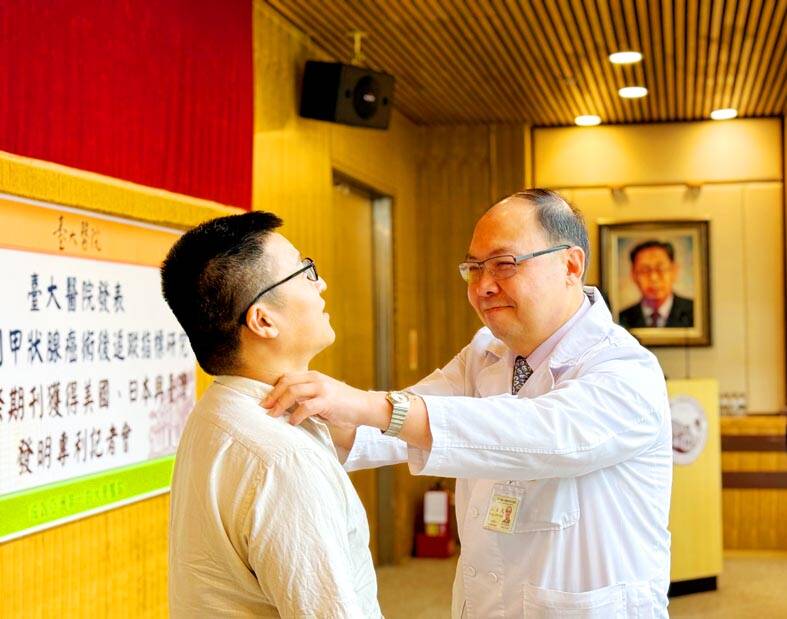A National Taiwan University Hospital (NTUH) research team has become the first to develop a noninvasive urinary biomarker to monitor those recovering from thyroid cancer and potentially predict the risk of recurrence, the hospital said yesterday.
NTUH Department of Internal Medicine deputy director Wang Chih-yuan (王治元), who led the research team, said thyroid cancer is among the 10 most common cancers in Taiwan and the most common in the endocrine system, with about 5,000 new cases diagnosed each year.
About 80 percent of all thyroid cancer cases are papillary thyroid carcinoma, which tends to grow slowly and has a relatively good prognosis if treated appropriately, while other types of thyroid cancer include follicular carcinoma, medullary carcinoma and anaplastic carcinoma, Wang said.

Photo: CNA
As people with papillary thyroid cancer have relatively high survival rates of 20 to 30 years after treatment, developing an effective lifelong follow-up biomarker for early detection of a recurrence is important, he said.
Many people undergo a thyroidectomy to remove a portion or the entire thyroid gland, which is combined with radioactive iodine therapy, but the recurrence rate after surgery is 10 to 28 percent, he said.
In common clinical practice, follow-up treatment involves periodically measuring a person’s thyroglobulin levels in their blood to detect any remaining cancer cells and monitor for recurrence, Wang said.
However, the thyroglobulin antibody can interfere with the blood test result, and a recombinant human thyrotropin stimulation might be needed to increase the test’s sensitivity, but that is costly — about NT$40,000 per test, he said.
In the past several years, Wang’s research team analyzed urinary exosomal proteins, and found that the urinary exosomal thyroglobulin could be used as a biological marker to substitute serum thyroglobulin, as it is more sensitive and accurate, and is not affected by the thyroglobulin antibody.
Exosomes are nanovesicles secreted into extracellular environments, including plasma, saliva, urine and other body fluids, and can carry nucleic acids, proteins and lipids that are unique to the origin cell, the team’s paper said.
Studies have indicated that exosomes hold promise in the diagnosis of thyroid diseases, it said.
The research team collected urine samples from people diagnosed with papillary thyroid carcinoma and follicular carcinoma, from pre-surgery, post-surgery, and at three and six months after their surgery for analysis, Wang said.
They found a significant correlation between urinary exosomal thyroglobulin concentration and tumor size and the anatomic stage of the person’s cancer, he said.
The findings suggest that urinary exosomal thyroglobulin could be useful for predicting the risk of thyroid cancer recurrence, he said.
A urine test is noninvasive and could potentially detect cancer recurrence three to five years earlier than through a thyroglobulin blood test, he added.
“Our study not only provides thyroid cancer patients a more sensitive post-surgery tracking method, it can also hopefully reduce their financial burden and mental stress,” Wang said.
The team’s latest finding was published in May in the International Journal of Nanomedicine.
The biomarker the team developed has received patent approval in Japan, the US and Taiwan, the hospital said.

SHIPS, TRAINS AND AUTOMOBILES: The ministry has announced changes to varied transportation industries taking effect soon, with a number of effects for passengers Beginning next month, the post office is canceling signature upon delivery and written inquiry services for international registered small packets in accordance with the new policy of the Universal Postal Union, the Ministry of Transportation and Communications said yesterday. The new policy does not apply to packets that are to be delivered to China, the ministry said. Senders of international registered small packets would receive a NT$10 rebate on postage if the packets are sent from Jan. 1 to March 31, it added. The ministry said that three other policies are also scheduled to take effect next month. International cruise ship operators

HORROR STORIES: One victim recounted not realizing they had been stabbed and seeing people bleeding, while another recalled breaking down in tears after fleeing A man on Friday died after he tried to fight the knife-wielding suspect who went on a stabbing spree near two of Taipei’s busiest metro stations, Taipei Mayor Chiang Wan-an (蔣萬安) said. The 57-year-old man, identified by his family name, Yu (余), encountered the suspect at Exit M7 of Taipei Main Station and immediately tried to stop him, but was fatally wounded and later died, Chiang said, calling the incident “heartbreaking.” Yu’s family would receive at least NT$5 million (US$158,584) in compensation through the Taipei Rapid Transit Corp’s (TRTC) insurance coverage, he said after convening an emergency security response meeting yesterday morning. National

PLANNED: The suspect visited the crime scene before the killings, seeking information on how to access the roof, and had extensively researched a 2014 stabbing incident The suspect in a stabbing attack that killed three people and injured 11 in Taipei on Friday had planned the assault and set fires at other locations earlier in the day, law enforcement officials said yesterday. National Police Agency (NPA) Director-General Chang Jung-hsin (張榮興) said the suspect, a 27-year-old man named Chang Wen (張文), began the attacks at 3:40pm, first setting off smoke bombs on a road, damaging cars and motorbikes. Earlier, Chang Wen set fire to a rental room where he was staying on Gongyuan Road in Zhongzheng District (中正), Chang Jung-hsin said. The suspect later threw smoke grenades near two exits

The Forestry and Nature Conservation Agency yesterday launched a gift box to market honey “certified by a Formosan black bear” in appreciation of a beekeeper’s amicable interaction with a honey-thieving bear. Beekeeper Chih Ming-chen (池明鎮) in January inspected his bee farm in Hualien County’s Jhuosi Township (卓溪) and found that more than 20 beehives had been destroyed and many hives were eaten, with bear droppings and paw prints near the destroyed hives, the agency said. Chih returned to the farm to move the remaining beehives away that evening when he encountered a Formosan black bear only 20m away, the agency said. The bear